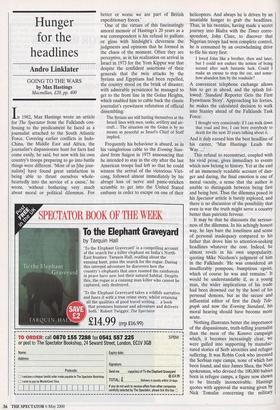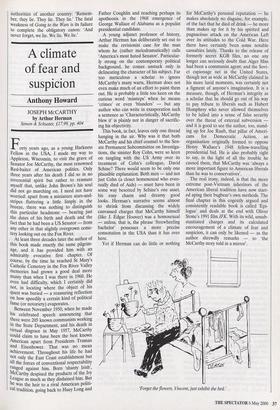Hunger for the headlines
Andro Linklater
GOING TO THE WARS by Max Hastings Macmillan, f20, pp. 400 In 1982, Max Hastings wrote an article for The Spectator from the Falklands con- fessing to the predicament he faced as a journalist attached to the South Atlantic Force. Covering earlier conflicts in Indo- China, the Middle East and Africa, the journalist's dispassionate hunt for facts had come easily, he said, but now with his own country's troops preparing to go into battle things were different. 'Most of us [the jour- nalists] have found great satisfaction in being able to thrust ourselves whole- heartedly into the service of a cause,' he wrote, 'without bothering very much about moral or political dilemmas. For better or worse we are part of British expeditionary forces.'
One of the virtues of this fascinatingly amoral memoir of Hastings's 20 years as a war correspondent is his refusal to palliate or gloss with hindsight's cleverness the judgments and opinions that he formed in the chaos of the moment. Often they are perceptive, as in his realisation on arrival in Israel in 1973 for the Yom Kippur war that despite the confident assertions of their generals that the twin attacks by the Syrians and Egyptians had been repelled, the country stood on the brink of disaster; with admirable persistence he managed to get to the front line in the Golan Heights, which enabled him to cable back the classic journalist's eyewitness refutation of official dissembling:
The Syrians are still hurling themselves at the Israeli lines with men, tanks, artillery and air- craft... The situation on the Golan is by no means as peaceful as Israel's Chief of Staff implied.
Frequently his behaviour is absurd, as in his vainglorious cable to the Evening Stan- dard from Saigon in 1975 announcing that he intended to stay in the city after the last American troops had left so that he could witness the arrival of the victorious Viet- cong, followed almost immediately by his abrupt loss of nerve and panic-stricken scramble to get into the United Stated embassy in order to escape on one of their helicopters. And always he is driven by an insatiable hunger to grab the headlines. Thus, in his twenties, having made a secret journey into Biafra with the Times corre- spondent, John Clare, to discover that Nigerian troops had won complete control, he is consumed by an overwhelming drive to file his story first:
I loved John like a brother, then and later, but I could not endure the notion of being second after such fantastic luck. Could I make an excuse to stop the car, and some- how abandon him by the roadside?
A convenient telephone exchange allows him to get in ahead, and the splash fol- lowed: 'Standard Reporter Gets the First Eyewitness Story'. Approaching his forties, he makes the calculated decision to walk into Stanley ahead of the Falklands Task Force:
I thought very consciously: if I can walk down that road and live, I can bore everybody to death for the next 20 years talking about it.
And it duly earned him the best headline of his career, 'Max Hastings Leads the Way....'
This refusal to reconstruct, coupled with his vivid prose, gives immediacy to events which now belong to history. Yet at the end of an immensely readable account of dan- ger and daring, the final emotion is one of moral vacuity, a sense that the author is unable to distinguish between being first and being best. Thus the dilemma posed in his Spectator article is barely explored, and there is no discussion of the possibility that even in war the truth might serve a country better than patriotic fervour.
It may be that he discounts the serious- ness of the dilemma. In his achingly honest way, he lays bare the loneliness and sense of personal inadequacy compared to his father that drove him to attention-seeking headlines whatever the cost. Indeed, he almost revels in his own unpopularity, quoting Mike Nicolson's judgment of him in the Falklands: 'He was considered an insufferably pompous, bumptious egoist, which of course he was and remains.' It would be understandable if, as a young man, the wider implications of his trade had been drowned out by the howl of his personal demons, but as the secure and influential editor of first the Daily Tele- graph and now the Evening Standard, his moral hearing should have become more acute.
Nothing illustrates better the importance of the dispassionate, truth-telling journalist than the mess of the Kosovo campaign which, it becomes increasingly clear, we were gulled into supporting by manufac- tured stories of Serb atrocities and refugee suffering. It was Robin Cook who invented the Serbian rape camps, none of which has been found, and nice James Shea, the Nato spokesman, who devised the 100,000 babies born in refugee camps, a figure now shown to be literally inconceivable. Hastings quotes with approval the warning given by Nick Tomalin concerning the military authorities of another country: 'Remem- ber, they lie. They lie. They lie.' The fatal weakness of Going to the Wars is its failure to complete the obligatory canon: 'And never forget, we lie. We lie. We lie.'



































































 Previous page
Previous page